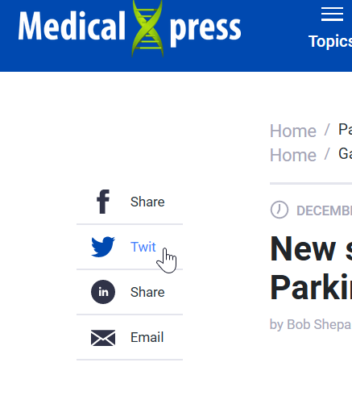Turning garbage into drugs, the better AMD med, gravity’s a downer, and more
02 Dec 2022
Posted by Andrew Kantor
And then there were none
The FDA has ended the emergency use authorization for bebtelovimab — the last remaining antibody therapy for Covid-19. It doesn’t work against the variants now circulating.
This means if Paxlovid doesn’t work for someone, and they end up in hospital … there’s not a lot to be done. The best remaining treatments are molnupiravir (not very effective) and intravenous remdesivir.
Why they serve
Meet a couple of the amazing folks who are serving as volunteer board members for the Georgia Pharmacy Foundation. Why do they give their limited time to serving the foundation?
Sharon Deason, GPhF Board Member
 “Pharmacy has provided so much for me in my life. It was not just a job, but a profession. After retiring, I still felt I could give something to help and serve others — so now I volunteer my time on the Georgia Pharmacy Foundation board. Meeting the students and newly graduated pharmacists has given me hope for the future of pharmacy.”
“Pharmacy has provided so much for me in my life. It was not just a job, but a profession. After retiring, I still felt I could give something to help and serve others — so now I volunteer my time on the Georgia Pharmacy Foundation board. Meeting the students and newly graduated pharmacists has given me hope for the future of pharmacy.”
Tracie Lundie, GPhF Board Member
 “I want to ensure I find ways to give back and help shape the profession I love so much. Serving on the Georgia Pharmacy Foundation board allows me to contribute to my profession in a meaningful way and to help shape the profession with scholarship opportunities for students and development opportunities through Leadership GPhA.”
“I want to ensure I find ways to give back and help shape the profession I love so much. Serving on the Georgia Pharmacy Foundation board allows me to contribute to my profession in a meaningful way and to help shape the profession with scholarship opportunities for students and development opportunities through Leadership GPhA.”
Please click here to give a gift to the Georgia Pharmacy Foundation this year, and support a legacy of service in the pharmacy profession, and the people volunteering their time to ensure it lasts.
Garbage in, pharma out
Let’s say you have a garbage patch. A Great Pacific Garbage Patch. It’s filled with microplastics and other debris.
And let’s say you want to do something with that plastic. Unfortunately, a lot of it is polyethylene, which is only about 30 percent recyclable.
The obvious solution is to create a two-stage process: First you use pressure and chemicals to break down the the plastic into diacids, then you genetically engineer a fungus (Aspergillus nidulans) to turn those diacids into “significant quantities of antibiotics, cholesterol-lowering statins, immunosuppressants and [ironically] antifungals.”
And that’s exactly what USC pharmacy/chemical researchers did.
“We developed conditions where it is possible to get 83% of the mass of the polymer recovered as discrete, useful products. We can even take a low-density product like a plastic grocery bag and recover about 36% of those discrete monomers — that’s unheard of in polyethylene recycling.”
Gravity sucks
The good news: Gastroenterology researchers at Cedars-Sinai have a theory about the cause of irritable bowel syndrome.
The bad news: It’s gravity. Yep, that pesky fourth force of nature could be one of the causes of IBS simply by tugging our guts down. At least in theory.
“Our body systems are constantly pulled downward. If these systems cannot manage the drag of gravity, then it can cause issues like pain, cramping, lightheadedness, sweating, rapid heartbeat and back issues — all symptoms seen with IBS. It can even contribute to bacterial overgrowth in the gut, a problem also linked to IBS.”
Making chemo tolerable
For patients taking cisplatin — the OG cancer drug — side effects can be a huge problem. Huge as in “stop taking the meds” huge. But an existing drug may reduce those side effects without affecting the important stuff.
It’s istradefylline, according to Michigan State researchers. The Parkinson’s treatment.
They aren’t 100% sure why it works, but the prevailing theory is that cisplatin stresses cells so they release adenosines; istradefylline stops that release.
So far it’s only been tested in preclinical trials, but the fact that istradefylline is already FDA-approved will mean human testing can happen a lot faster.
AMD meds: One is better
One of two drugs for treating age-related macular degeneration is better than the other. A study out of Johns Hopkins found that aflibercept was better than bevacizumab.
[N]early half of patients treated with aflibercept could safely stop eye injection therapy after one year without further vision loss. Only 17% of patients taking […] bevacizumab, were able to safely wean from the drug at a year.
In fact, they say, “[P]otentially a third of patients with wet AMD could safely pause therapy after one year of monitoring by a physician.”
Non-pharma science
Questions I never thought to ask: Do color-blind people experience seasonal affective disorder as much as regular folks? (Yes, probably. The mechanism for SAD isn’t known, but it seems to be via a different pathway than color perception. It might even be related to vitamin D production. (Reddit thread.)
Looks like the folks at Medical Xpress have an opinion



